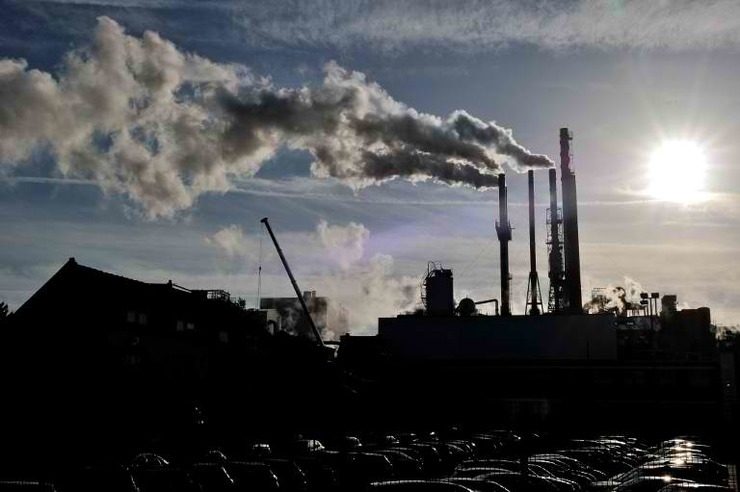SUMMARY
This is AI generated summarization, which may have errors. For context, always refer to the full article.

COPENHAGEN, Denmark (UPDATED) – Time is running out to limit global warming to 2ºC (3.6ºF), the UN’s climate experts warned Sunday, November 2, saying current carbon emissions were a potential path to disaster.
Crowning a landmark review, the Intergovernmental Panel on Climate Change (IPCC) said emissions of three key greenhouse gases were at their highest since more than 800,000 years ago, when mammoths and mastodons roamed the earth.
Earth, it warned, is on a likely trajectory for at least 4ºC warming over pre-industrial times by 2100 – a recipe for worsening drought, flood, rising seas and species extinctions.
Many could face hunger, homelessness and conflict in the scramble for precious resources.
UN chief Ban Ki-moon, who in September hosted a special summit on climate change, said: “Human influence on the climate system is clear, and clearly growing.”
“We must act quickly and decisively if we want to avoid increasingly disruptive outcomes,” Ban said, describing it as a “myth” that tackling carbon emissions was costly.
US Secretary of State John Kerry said the report was a fresh warning – “another canary in the coal mine” – while France, which is to host a UN climate conference in December 2015, called for “immediate, all-round mobilization“.
French President Francois Hollande called climate change one of the “big challenges” for the global community and pledged to act for the “wellbeing … of the planet”.
IPCC chief Rajendra Pachauri said there remained “little time before the window of opportunity to stay within 2ºC of warming closes.”
“To keep a good chance of staying below 2ºC, and at manageable costs, our emissions should drop by 40 to 70% globally between 2010 and 2050, falling to zero or below by 2100.”
Seizing on the report, green groups demanded the phaseout of coal, oil and gas that are driving the carbon problem.
“Renewables and the smart use of energy are the quickest and cleanest ways to cut emissions,” said Greenpeace’s Kaisa Kosonen.
“Any technology that ‘handles’ emissions rather than replaces fossil fuels is like smoking crack to solve an alcohol addiction.”
The first overview by the Nobel-winning organization since 2007 – comes ahead of UN talks in Lima next month to pave the way to a 2015 pact in Paris to limit warming to a safer 2ºC.
But the negotiations have been hung up for years over which countries should shoulder the cost for reducing carbon emissions, derived from the world’s cornerstone energy sources today.
“Human influence on the climate system is clear, and clearly growing… We must act quickly and decisively if we want to avoid increasingly disruptive outcomes.”
– UN Secretary-General Ban Ki-moon
The report said switching to cleaner sources, reducing energy efficiency and implementing other emission-mitigating measures would be far cheaper than the cost of climate damage.
The bill today for doing this is affordable, but delaying beyond 2030 would cause the cost – and the climate peril – to spiral for future generations.
“Ambitious” carbon curbs would shave just 0.06 percentage points annually from global consumption this century, targeted to grow by 1.6-3.0% annually, the IPCC said.
Under the lowest of four emissions scenarios, global average temperatures over this century are likely to rise by 0.3-1.7ºC (0.5-3.1ºF), leading to between 26-55 cm in sea-level rise.
Under the highest scenario, warming would be 2.6-4.8 C, causing sea-level rise of 45-82 cm.
4ºC world
The report warned bleakly that on current trends, “warming is more likely than not to exceed 4ºC” over pre-industrial levels by 2100.
Without further action to tame emissions, “warming by the end of the 21st century will lead to very high risk of severe, widespread and irreversible impacts globally,” it said.
It pointed to:
- Worse food security, with impacts on grain harvests and fish catches
- Accelerating species extinction and damage to ecosystems on which mankind depends
- Migration caused by climate-related economic damage and loss of land from rising seas and storm surges
- Greater water stress, especially in sub-tropical regions, but also a greater risk of flooding in northerly latitudes and the equatorial Pacific
- Risk of conflict over resources as well as health dangers from heatwaves and spread of mosquito-borne disease
The IPCC was set up in 1988 to provide governments with neutral advice about global warming, its impacts and the options for tackling it.
Sunday’s synthesis report encapsulated three previous volumes published over the last 13 months.
They were written by more than 800 experts, whose work then went through arduous review and commentary by outside specialists.
The IPCC’s fourth report helped open the way to the 2009 Copenhagen Summit, where attempts to forge a global treaty nearly ended in a fiasco.
“Maybe, looking back, at the time world leaders might not have been fully ready to engage themselves,” Ban said.
“They were more focusing on national priorities rather than global priorities. Since then, we have been building up on what we had discussed… Now we are going to Lima, Peru, and our final destination will be Paris by the end of next year.” – Rappler.com
Add a comment
How does this make you feel?
There are no comments yet. Add your comment to start the conversation.